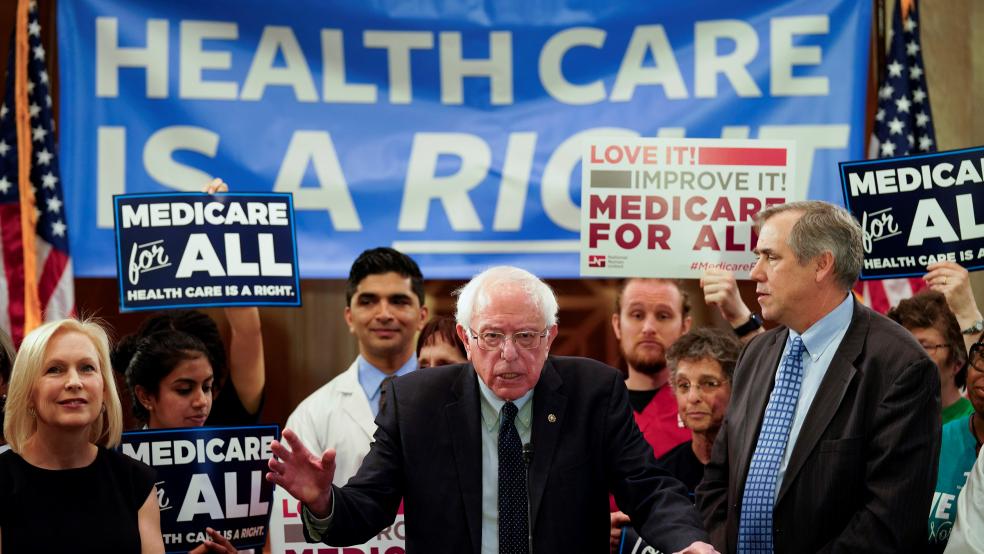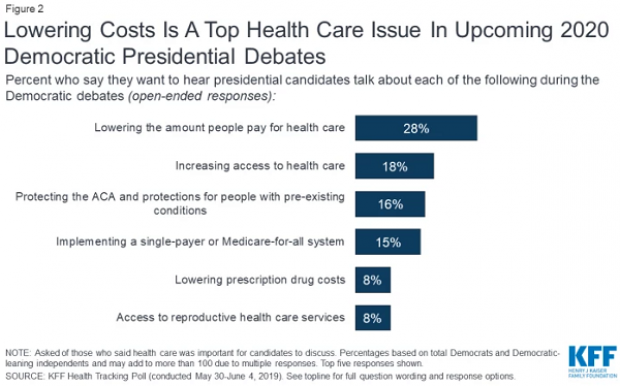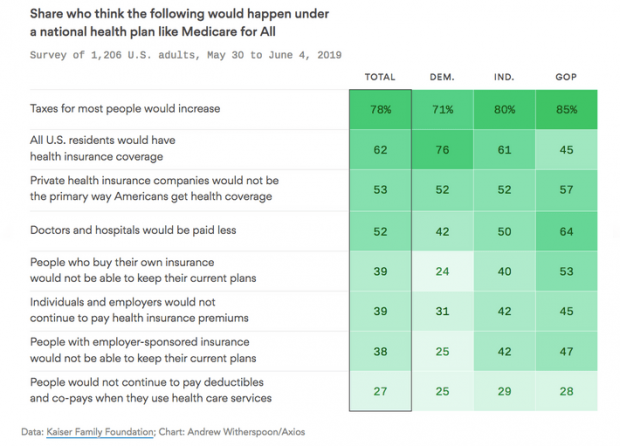The 2020 elections are still more than 500 days away, but the first Democratic debates of the presidential campaign are fast approaching. When the candidates gather on June 26 and 27, it’s clear what voters want them to address: health care. More specifically, bringing down health care costs.
The latest tracking poll from the Kaiser Family Foundation finds that 87% of Democratic and Democratic-leaning voters say it’s very important for candidates to talk about health care at the debate. When asked to describe in their own words which health care issues they want addresses, more than one in four pointed to the affordability of care while another 8% said lowering prescription drug prices. Increasing access to care was cited by 18% of respondents, and protecting the Affordable Care Act and protections for people with pre-existing medical conditions was mentioned by 16%.
Another 15% mentioned implementing a single-payer or Medicare-for-all system.
The priorities differed among liberals and moderates, with liberals more likely to mention increased access to health care and implementing Medicare for All.
The Kaiser poll also found that many Americans, especially Democrats, remain confused about just what a single-payer Medicare for All system would entail. The poll finds that most voters believe that taxes would rise for most people under a Medicare for All system. That’s true. But most voters also believe that Americans would have the option of keeping their private insurance plans and would continue to pay premiums, deductibles and co-pays.
By contrast, the Medicare for All overhaul proposed by Sen. Bernie Sanders (I-VT) or in a similar House bill forth by Rep. Pramila Jayapal (D-WA) would have a government-run system replace most private insurance and provide comprehensive health care benefits without any premiums, deductibles or co-pays. (To be fair, other Democrats have spoken in favor of a hybrid system that allows private insurance to continue to operate alongside a public option.)
The Kaiser poll results are similar to those of a Navigator Research poll we told you about yesterday, which found that 60% of voters, including 73% of Democrats, said that “Medicare for All” means a health care system “that lets anyone buy Medicare instead of their private insurance, if they want to.”
This Axios chart breaks down the Kaiser Family Foundation voters’ conceptions:
The disconnect between American’s perceptions of Medicare for All and the flagship legislation proposed under that name may stem from voters not understanding or knowing the details of the proposals, a Kaiser Family Foundation polling expert told Kaiser Health News — or it could be the result of public skepticism about how much lawmakers would change the existing system.
“It’s not terribly surprising that Americans would have differing ideas of what Medicare-for-all would mean,” The Washington Post’s Paige Winfield Cunningham writes. “Such a sweeping overhaul of the country’s patchwork health insurance system hasn’t been attempted before — and even though the 2020 contenders frequently mention it, they tend to shy away from details on exactly how the whole thing would work.”
Why it matters: Americans’ perception of Medicare for All hews more closely to plans offering a public option than to the Sanders vision.
At the same time, Eric Levitz of New York magazine notes that “the polls also suggest that voters are unaware of single-payer’s most popular features. When Navigator asked respondents to pick their top three priorities for health-care policy, reducing out-of-pocket costs, premiums, deductibles, and drug prices were by far the most commonly cited. Meanwhile, ‘ensuring that you can keep your existing insurance coverage’ ranked next to last.”
That suggests that the Sanders version of Medicare for All would be more popular “if voters understood that it would abolish premiums and deductibles and bring down overall health-care costs,” Levitz suggests. On the other hand, support for a public option might be even higher than it is if voters knew that such a plan wouldn’t necessarily require significant middle-class tax increases.
The bottom line: The upcoming debates will be a great opportunity for candidates to explain what they envision for the health care system. Also, it’s a good thing we still have 500 days until the election.







